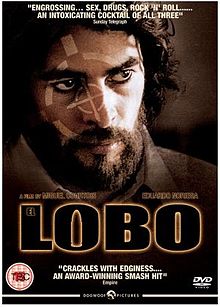
EL LOBO
Spain, 2004, 125 minutes, Colour.
Eduardo Noriega.
Directed by Michel Curtois
Spanish cinema is still coming to terms with the Franco era, with dramas about the Civil War and its consequences and, more recently, films about the final years of Franco’s regime. The recent Salvador is a story of young rebels, terrorist action in the early 1970s and Salvador Puig as the last person to be executed in 1974. The action in El Lobo takes place at the same time. However, the focus is on ETA and the Spanish government’s campaign against the ETA cells in the year’s before Franco’s death.
It is based on actual events.
The Lobo, the Wolf, of the title is a young construction worker from the Basque territories who had friends in ETA but was dismayed when they executed a taxi-driver acquaintance for alleged supplying of information to the Spanish authorities. When he is taken in by the police, the authorities offer him a chance to follow his principles and gain some finance for his straitened family by becoming an informer, then persuading him to infiltrate ETA at its highest level. This he did, keeping his cover through great personal difficulties, and handing over 150 members of ETA to the authorities. Of course, he is eventually discarded and abandoned by the authorities. A post-script tells us that thirty years later, he is still on an ETA hit list.
The film moves well and keeps audiences involved. And Eduardo Noriega is an impressive and engaging screen presence as The Wolf. In fact, the whole cast, both ETA and the Spanish police and secret service, are all convincing. While it is really an espionage drama, it has an almost documentary-like feel about it.
What we are to think and feel is quite ambiguous. It would be interesting to hear how Spanish audiences found it (it was nominated for a number of awards). It would be even more interesting to hear how patriotic Basques found it. The Wolf claims he is a man of principle against the violence perpetrated by ETA, but he is a double agent. The Spanish authorities are ultimately devious and brutal. The ETA terrorists are extremists and unscrupulously violent.
1. A film about Spain, the 1970s, the end of the Franco era, the status of ETA, police work, infiltration, double agents?
2. Audience familiarity with this Spain, with the social issues, the dictatorship of Franco and its effect, the Basque rebellion, the establishing of ETA, its subversive activities against the Spanish government? Its own internal divisions?
3. The credibility of the plot, the central character based on an actual person and his activities?
4. The Spanish settings, sense of location, the Spanish countryside, the towns and villages, extension into France? The musical score and atmosphere?
5. The film establishing the situation in the mid-1970s, Franco and his dying, his heritage, rebellion against him, Conservative forces in Spain? The situation in the Basque territories, police and army and the attacks on the organisation?
6. The opening, murders, the police investigations? Txema, his being a worker, not particularly well educated, his wife and home life? His being associated
with terrorist groups? Susceptible to the invitation by the police and government?
7. The police, interrogating Txema, the idea that he would be good undercover agent? The pressure on him, persuasion and his lack of interest, his financial situation, perhaps engineered by the police themselves, his reasons for saying yes? The effect on his wife, his absences, her growing suspicions, thinking him a traitor?
8. His being accepted by ETA, the questioning, his ability to blend in, handing on information?
9. The organisation, the various leaders, their roles in propaganda, on violent action, killings? How well delineated the various characters, audience response to each of them, the hierarchy, the orders, carrying them out, personal difficulties, tensions?
10. Txema and his ability to blend in, the relationship with Amaia, the sexual relationship, with his wife in the background?
11. The film’s attention to detail of the various missions, Txema and his contributions, his abilities, his following orders?
12. The struggles within the organisation, rivalries, dissension? The effect of this on Txema?
13. The police contacts, ideologies, controlling Txema, using him, prepared to abandon him?
14. The film working as a thriller, almost documentary-like? Insight into the experiences of Spain at the time?